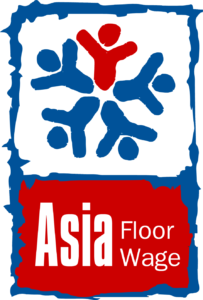One of AFWA’s central tenets has been to build women workers and women leaders’ power in the global garment supply chain. All of AFWA’s work – such as its woman-centred formulation of living wage, its core principles, People’s Tribunals – have always placed women workers at the centre.
AFWA believes that gender-based violence and harassment (GBVH) is corrosive to women workers’ sense of self and makes them voiceless and powerless. GBVH is a barrier to women workers’ accessing other fundamental rights such as Freedom of Association and Living Wage.
AFWA believes that prevention of GBVH is of critical importance through both personal transformation of women workers and building workers’ collective power. AFWA’s Strategy brings together lessons both from the women’s movement and the labour movement.
In 2018, AFWA founded the Women’s Leadership Committee (WLC) composed of women trade union leaders across production countries in Asia. The WLC pursues dialogue with brands and other stakeholders to end gender-based violence in garment supplier factories.
Asia Floor Wage Alliance’s Safe Circle Approach
Women workers and their trade unions are essential to ending GBVH on fast fashion production lines. The AFWA Safe Circle Approach takes a bottom-up perspective to ending GBVH by engaging women workers as agents of change at the production line level. This approach involves not only potential victims, but also bystanders and perpetrators in face-to-face, regular, small group engagement processes designed to address behavioural violence on production lines in garment factories.
Consistent with UN Women and ILO recommendations (2019), Safe Circles seek to develop and sustain a positive organizational culture on garment production lines, co-produced by workers and management to advance the shared goal of preventing GBVH. This process is designed to complement existing training approaches.
The AFWA Safe Circle approach is guided by the following core principles:
1. Support proactive engagement in preventing GBVH among front-line (production line) workers who are targets of violence
2. Empower women workers to have a constructive voice at work
3. Facilitate ongoing interaction and consensus-building among workers and supervisors who work together at the frontlines (production lines)
4. Design and achieve measurable and observable goals and outcomes
5. Increase communication/behavioral competence among supervisors and others in hierarchical positions of authority
Improved communication and collaboration between workers and supervisors on GBVH has the potential to achieve the following objectives:
1. Change supervisory relationships and practices at the level of the production line
2. Identify and address more covert forms of gendered bullying before they escalate and manifest in more aggressive forms of violence
3. Increase reporting among targets of violence by promoting a “feedback rich” environment where middle managers are trained to respond to complaints and issues in an emotionally intelligent way, and where
people feel comfortable speaking up and listening
In May 2018, Asia Floor Wage Alliance (AFWA) and Global Labor Justice (GLJ) alongside member unions and organizations released three ground-breaking factory level research reports exposing gender- based violence in H&M, GAP and Walmart’s Asian garment supply chains.
The reports projected experiences of GBVH in Asian global garment supply chains into public discourse and the ILC standard setting deliberations, calling for a commitment to end GBVH from multinational brands employing tens of thousands of women in the global south.
These reports documented sexual harassment and violence — including physical and sexual violence, verbal abuse, coercion, threats and retaliation, and routine deprivations of liberty including forced overtime. The research also makes clear these are not isolated incidents and that gender-based violence in the H&M, GAP and Walmart garment supply chains is a direct result of how brands conduct business.
Reports to the ILO on Gender Based Violence in Garment Supply Chains
One of AFWA’s central tenets has been to build women workers and women leaders’ power in the global garment supply chain. All of AFWA’s work – such as its woman-centred formulation of living wage, its core principles, People’s Tribunals – have always placed women workers at the centre.
AFWA believes that gender-based violence and harassment (GBVH) is corrosive to women workers’ sense of self and makes them voiceless and powerless. GBVH is a barrier to women workers’ accessing other fundamental rights such as Freedom of Association and Living Wage.
AFWA believes that prevention of GBVH is of critical importance through both personal transformation of women workers and building workers’ collective power. AFWA’s Strategy brings together lessons both from the women’s movement and the labour movement.
Global Labour Justice Series
Pillar 1, End Gender Based Violence and Harassment: Gender Justice on Garment Global Supply Chains, An Agenda to Transform Fast-Fashion
On May 28, 2018, the ILO Standard Setting Committee on violence and harassment in the world of work began the historic task of creating a global standard protecting workers from violence and harassment, with a specific mandate to address gender-based violence.
As part of these deliberations, this report —the first in the series, Gender Justice on Garment Global Supply Chains: An Agenda to Transform Fast-Fashion—provides a roadmap for international legal frameworks, criteria for corporate accountability initiatives, and a transformative new prevention approach from the Asia Floor Wage Alliance to end GBVH on garment production lines.
Gender-Based Violence during the Pandemic
AFWA’s report, titled ‘A Stitch in Time Saved None: How Fashion Brands Fueled Violence Beyond the Factory’ documents gender-based violence in fast fashion supply chains during the Covid-19 pandemic. The report, based on interviews with 400+ women workers across 6 Asian countries, explores how the business models of global fashion brands exacerbated garment workers’ vulnerability to violence both inside the factories and in their homes, families and communities.
